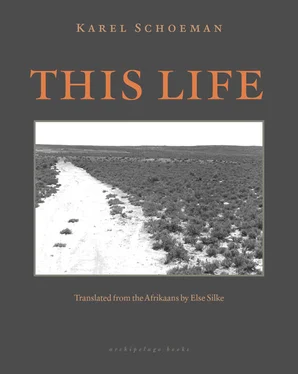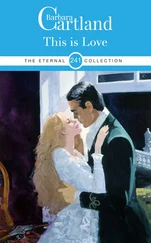Against the furthest wall of the voorhuis as you enter, you would probably expect a hearth in this cold region, but our fire was made in the kitchen, and when a visitor once remarked on it, Father shrugged and answered, “No, but that is the way my late mother had wanted it,” as if that explained everything. Did Ouma want to keep the cooking and the servants out of her voorhuis, and was it her way of establishing her own way of life in the house that had been built under her own eyes and hands? In the furthest wall, where you would expect the hearth, two small wall-cupboards with glazed doors had been built in, the only glass panes to be found in the Roggeveld in my childhood years, and in those cupboards Ouma’s china was kept, cups and saucers and bowls patterned in red and white and blue with a touch of gold here and there in between. Mother never used them or even took them out of the cupboards, and as a child I sometimes stood there on a Sunday afternoon, gazing for hours through the glass panes at the red and blue and gold of the patterns on the china, the only brightness in our sombre home or in the faded, flat region where I grew up. Now Stienie probably has it all, though I cannot remember ever having seen it; once people from the Boland, who were interested in such things, called on us in our town house, and Stienie mentioned a bit disdainfully that she still had some of Great-ouma’s old china, but where she kept it I do not know and she never used it, because they were old-fashioned pieces and not to her taste at all. That is all I know of Ouma, the fact that she came from the Bokkeveld and had a house built with recessed wall-cupboards to display her china. Oupa lies buried here in the graveyard behind the ridge, with a stone on which someone chiselled his name and dates carefully, for he died first and she saw to it that a headstone was made for him, but when she herself died, no one took the trouble, so she rests anonymously under one of the overgrown stone mounds beside him. Father had probably still known which grave was hers, but today no one would be able to point it out.
The brightly-coloured china in the wall-cupboards drew my attention as a child, but, even so, there was more that Oupa and Ouma had left us. When I was a child we seldom left the farm except when we moved down to the Karoo in winter, but as I grew older and we rode over to neighbouring farms more often for weddings and funerals, I came to appreciate better the modest and unobtrusive wealth that we had inherited from them: not merely the brightly-coloured china that had drawn the attention of a child, but the solid homestead with its strong walls and the few heavy, plain pieces of furniture that had not been made locally but had been brought over the mountain passes of the Boland by wagon: Father and Mother’s four-poster bed, the cots, the large table in the voorhuis with its riempie chairs arranged along the walls, and the kists in which our clothes and linen were stored. This house and this furniture which we had inherited from my grandparents seemed to set us apart from our neighbours in the Roggeveld, and as I came to realise that fact, I experienced — yes, I too — something of the pride and deadly vanity that pervaded our family, intensified and reinforced from generation to generation. The ambition I was spared, however, for it was not my task to strive and to strain ahead desperately, but to see, to hear and to remember, as I understand at last, here at the end of my life.
When you approach the farm, whether from the Karoo by way of the old road over Vloksberg Pass or from the village, the new house is the first thing you see, its shiny roof reflecting the light from a distance long before you arrive, and I am the only one who, almost instinctively, still leans forward in the cart every time we return, to look at the old house with its outbuildings against the ridge, waiting to welcome me. When I picture the arrival on the farm here before me in the dark, it appears to me as it was during all those years before the new house was built, for no matter which road you chose, from the direction of Groenfontein or Oorlogskloof — the village did not exist in those days — following the ruts of the wheels across the low hills and rocky ledges, or along the pass up the mountainside past Klipfontein, when you reached that wide, open, rolling land of the escarpment, you saw from a great distance, across the waving shrubs and grass and the glitter of the dams, the house with its high, thatched roof against the ridge, the house with the shed and stables and other out-buildings some distance behind, the orchard with its windswept pear trees, and the graveyard with its irregular wall of stacked stones. It was the world of my youth, and the surrounding farms formed its borders, except when we moved down to the Karoo in winter.
“Not that he started out with much,” I heard Oom Herklaas Vlok remark after Father’s funeral, “only the two farms and a handful of sheep”, but by the time he died the land and the flocks of sheep had increased, and there was a measure of disapproval in Oom Herklaas’s voice. Though envy may have existed in the district, I do not believe there was ever malice, not to mention enmity, for Father was never one to make enemies, a placid, silent man who stroked his beard and thought long before he voiced an opinion or answered a question, and whose words people were prepared to heed. So thorough could his deliberation be and so slow was he to decide one way or another, that it was often Mother who made the decisions, and sometimes, impetuous as she was, she became so impatient with his indecisiveness that she took the lead herself while he was still considering his course of action. She thrashed the boys with the horsewhip or sjambok even when they were all but grown-up, and sometimes it was also she who gave the herdsmen a thrashing, because Father seldom and reluctantly raised his hand against anyone. Most probably it was also she who had encouraged him over the years of their marriage to purchase those sheep flocks and that land.
As the only daughter I grew up in the house with Mother and she died before my eyes, for almost fifty years she and I lived close together, day in, day out, here on the farm or in the town house where she died, but what can I say about her now, when I must review my memories and try to explain, to understand? A slender, dark, quick woman with a fierce temper and a sharp tongue — though this much all the servants and the neighbours also knew, and all the people of my generation still remember her so today and tell stories of her explosive temper and her stubborn pride when they do not know that I am close enough to hear; and I, her own daughter, after being with her for nearly fifty years, cannot really find anything to add to that, for more than that she did not reveal even to me. But how could such a thing be possible? Something there must be among all the incidental words and gestures, shards and tiny splinters, that one can scrape together and arrange, to be able to understand and explain, to try and understand, to try and forgive.
From my childhood days I remember only what other people remember as well, though I may have had more occasion to observe it all: the diligence, the drive and the passion, the persistence that could so easily become stubbornness, the sudden attacks of blind and uncontrollable fury that scared us anew every time with their violence; drive and passion, yes, and I would almost say obsession, as if she were being swept towards some distant and scarcely perceptible goal by powers invisible to everyone but her, and unfathomable even to her. Does it sound strange when I try to explain it like this? Perhaps I exaggerate now, but I am only trying to find words to describe something of that indomitable woman in whose shadow I grew up and at whose bedside I kept vigil during her long, painful, wordless death. That is all I can still do, try, for no one has remained who can do more than that.
Читать дальше












